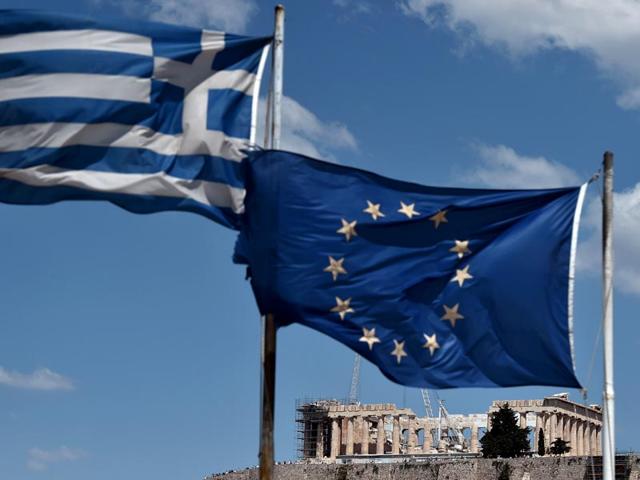We’re in a crisis and it’s all Greek to me right now
I’ve had a very tough week with the Greek crisis. It was very exciting when it began and everybody started writing about Grexit, short for a Greek exit from the euro. We immediately started doing stories about a Grextension, or extension of loans to Greece. I wrote a headline saying a Grollover, or rollover of Greek debt, would be nice. When the Greek government called for a referendum, we dubbed it a Greferendum.
I’ve had a very tough week with the Greek crisis. It was very exciting when it began and everybody started writing about Grexit, short for a Greek exit from the euro. We immediately started doing stories about a Grextension, or extension of loans to Greece. I wrote a headline saying a Grollover, or rollover of Greek debt, would be nice. When the Greek government called for a referendum, we dubbed it a Greferendum.

At the moment, everything is in Grimbo (Greek limbo) and we’re hoping for a Gragreement, or a Graccord. But somehow, adding ‘Gr’ in front of words no longer has the same charm. It has lost its zing. In fact, it’s become so boring that I have stopped grunting, griping and grumbling, preferring instead to unt, ipe and umble. The final straw was when I started signing myself Grakravarty and I realised I needed a whole new approach to Greece.
The obvious one was to call it a Greek tragedy. I said it was a Greek myth that Greeks weren’t hard-working. I mentioned the Trojan horse in 23 headlines, varying it with ‘Greeks bearing gifts’. I wove in Delphic utterances and Stoic calm. I desperately hoped politicians would soon find a solution and Greece would disappear from the news, relieving me from the pressure of coming up with fresh Greek metaphors. I slipped in a snide one of German policy being ‘Deutschland uber alles’, hoping that would force them to back down.
But I had no such luck. I tried to put the pressure on Greece instead. I wrote they should come down from their Olympian heights. I said they should adopt a more Spartan lifestyle. I told them debt was their Achilles’ heel. But the crisis went on and on. I understood then that an agreement would be both an Odyssey and a Sisyphean task.
I googled everything about Greece.I read up Greek philosophers. We headline writers met to swap ancient Greek references and weep over the Pandora’s Box we had opened when the initial ‘Grexit’ was coined.
Disheartened, I tried a new tack. I warned Russia would step in if Greece was forced to leave the Eurozone, by improvising on the song about the crocodile in ‘Alice in Wonderland’. Here it goes: ‘How gleefully Putin seems to grin/How neatly spreads his claws/And welcomes little Greece in/With gently smiling jaws.’
I tried grease and Greece. I said we needed to grease the skids to bring about an agreement. I waxed eloquent about the need for more elbow grease. We debated how to use ‘greased lightning’ and ‘grease their palms’.
But there was only so much grease Greece could take. I wondered whether we would soon have a Eureka moment and whether Europe’s hoi polloi would agree to forgive Greek debt. Carpe diem, I advised them, before someone told me that was Latin.
The task before us is Herculean, requiring a Homeric effort. The Greeks must give up their hectoring tone. Much depends on whether their negotiators have the Midas touch. If not, it could be ‘Acropolis Now’ for Greece.
My efforts did not go unnoticed. ‘You seem to be writing a lot about the Greek crisis,’ said my editor, ‘Could you tell me, in plain English, what the heck it’s all about?’ ‘Oh, it’s all Greek to me,’ I said woefully.
Manas Chakravarty is consulting editor, Mint. The views expressed are personal.





